Market Overview
The global Bio-based Polymers market size is expected to gain market growth in the forecast period of 2020 to 2025, with a CAGR of xx% in the forecast period of 2020 to 2025 and will expected to reach USD xx million by 2025, from USD xx million in 2019.
The Bio-based Polymers market report provides a detailed analysis of global market size, regional and country-level market size, segmentation market growth, market share, competitive Landscape, sales analysis, impact of domestic and global market players, value chain optimization, trade regulations, recent developments, opportunities analysis, strategic market growth analysis, product launches, area marketplace expanding, and technological innovations.
Market segmentation
Bio-based Polymers market is split by Type and by Application. For the period 2015-2025, the growth among segments provide accurate calculations and forecasts for sales by Type and by Application in terms of volume and value. This analysis can help you expand your business by targeting qualified niche markets.
By Type, Bio-based Polymers market has been segmented into
Bio-Degradable
Non-Degradable
By Application, Bio-based Polymers has been segmented into:
Packaging
Agriculture
Automotive
Consumer Products
Others
Regions and Countries Level Analysis
Regional analysis is another highly comprehensive part of the research and analysis study of the global Bio-based Polymers market presented in the report. This section sheds light on the sales growth of different regional and country-level Bio-based Polymers markets. For the historical and forecast period 2015 to 2025, it provides detailed and accurate country-wise volume analysis and region-wise market size analysis of the global Bio-based Polymers market.
The report offers in-depth assessment of the growth and other aspects of the Bio-based Polymers market in important countries (regions), including:
North America (United States, Canada and Mexico)
Europe (Germany, France, UK, Russia and Italy)
Asia-Pacific (China, Japan, Korea, India and Southeast Asia)
South America (Brazil, Argentina, etc.)
Middle East & Africa (Saudi Arabia, Egypt, Nigeria and South Africa)
Competitive Landscape and Bio-based Polymers Market Share Analysis
Bio-based Polymers competitive landscape provides details by vendors, including company overview, company total revenue (financials), market potential, global presence, Bio-based Polymers sales and revenue generated, market share, price, production sites and facilities, SWOT analysis, product launch. For the period 2015-2020, this study provides the Bio-based Polymers sales, revenue and market share for each player covered in this report.
The major players covered in Bio-based Polymers are:
DowDuPont
Bayer Material
Evonik Industries
BASF
Cereplast
Arkema
Biosphere Industries
Mitsui Chemicals
DSM
Braskem
Anqing Hexing Chemical
Among other players domestic and global, Bio-based Polymers market share data is available for global, North America, Europe, Asia-Pacific, Middle East and Africa and South America separately. Our analysts understand competitive strengths and provide competitive analysis for each competitor separately.
The content of the study subjects, includes a total of 15 chapters:
Chapter 1, to describe Bio-based Polymers product scope, market overview, market opportunities, market driving force and market risks.
Chapter 2, to profile the top manufacturers of Bio-based Polymers, with price, sales, revenue and global market share of Bio-based Polymers in 2018 and 2019.
Chapter 3, the Bio-based Polymers competitive situation, sales, revenue and global market share of top manufacturers are analyzed emphatically by landscape contrast.
Chapter 4, the Bio-based Polymers breakdown data are shown at the regional level, to show the sales, revenue and growth by regions, from 2015 to 2020.
Chapter 5, 6, 7, 8 and 9, to break the sales data at the country level, with sales, revenue and market share for key countries in the world, from 2015 to 2020.
Chapter 10 and 11, to segment the sales by type and application, with sales market share and growth rate by type, application, from 2015 to 2020.
Chapter 12, Bio-based Polymers market forecast, by regions, type and application, with sales and revenue, from 2020 to 2025.
Chapter 13, 14 and 15, to describe Bio-based Polymers sales channel, distributors, customers, research findings and conclusion, appendix and data source.
Table of Contents
1 Market Overview
1.1 Bio-based Polymers Introduction
1.2 Market Analysis by Type
1.2.1 Overview: Global Bio-based Polymers Revenue by Type: 2015 VS 2019 VS 2025
1.2.2 Bio-Degradable
1.2.3 Non-Degradable
1.3 Market Analysis by Application
1.3.1 Overview: Global Bio-based Polymers Revenue by Application: 2015 VS 2019 VS 2025
1.3.2 Packaging
1.3.3 Agriculture
1.3.4 Automotive
1.3.5 Consumer Products
1.3.6 Others
1.4 Overview of Global Bio-based Polymers Market
1.4.1 Global Bio-based Polymers Market Status and Outlook (2015-2025)
1.4.2 North America (United States, Canada and Mexico)
1.4.3 Europe (Germany, France, United Kingdom, Russia and Italy)
1.4.4 Asia-Pacific (China, Japan, Korea, India and Southeast Asia)
1.4.5 South America, Middle East & Africa
1.5 Market Dynamics
1.5.1 Market Opportunities
1.5.2 Market Risk
1.5.3 Market Driving Force
2 Manufacturers Profiles
2.1 DowDuPont
2.1.1 DowDuPont Details
2.1.2 DowDuPont Major Business and Total Revenue (Financial Highlights) Analysis
2.1.3 DowDuPont SWOT Analysis
2.1.4 DowDuPont Product and Services
2.1.5 DowDuPont Bio-based Polymers Sales, Price, Revenue, Gross Margin and Market Share (2018-2019)
2.2 Bayer Material
2.2.1 Bayer Material Details
2.2.2 Bayer Material Major Business and Total Revenue (Financial Highlights) Analysis
2.2.3 Bayer Material SWOT Analysis
2.2.4 Bayer Material Product and Services
2.2.5 Bayer Material Bio-based Polymers Sales, Price, Revenue, Gross Margin and Market Share (2018-2019)
2.3 Evonik Industries
2.3.1 Evonik Industries Details
2.3.2 Evonik Industries Major Business and Total Revenue (Financial Highlights) Analysis
2.3.3 Evonik Industries SWOT Analysis
2.3.4 Evonik Industries Product and Services
2.3.5 Evonik Industries Bio-based Polymers Sales, Price, Revenue, Gross Margin and Market Share (2018-2019)
2.4 BASF
2.4.1 BASF Details
2.4.2 BASF Major Business and Total Revenue (Financial Highlights) Analysis
2.4.3 BASF SWOT Analysis
2.4.4 BASF Product and Services
2.4.5 BASF Bio-based Polymers Sales, Price, Revenue, Gross Margin and Market Share (2018-2019)
2.5 Cereplast
2.5.1 Cereplast Details
2.5.2 Cereplast Major Business and Total Revenue (Financial Highlights) Analysis
2.5.3 Cereplast SWOT Analysis
2.5.4 Cereplast Product and Services
2.5.5 Cereplast Bio-based Polymers Sales, Price, Revenue, Gross Margin and Market Share (2018-2019)
2.6 Arkema
2.6.1 Arkema Details
2.6.2 Arkema Major Business and Total Revenue (Financial Highlights) Analysis
2.6.3 Arkema SWOT Analysis
2.6.4 Arkema Product and Services
2.6.5 Arkema Bio-based Polymers Sales, Price, Revenue, Gross Margin and Market Share (2018-2019)
2.7 Biosphere Industries
2.7.1 Biosphere Industries Details
2.7.2 Biosphere Industries Major Business and Total Revenue (Financial Highlights) Analysis
2.7.3 Biosphere Industries SWOT Analysis
2.7.4 Biosphere Industries Product and Services
2.7.5 Biosphere Industries Bio-based Polymers Sales, Price, Revenue, Gross Margin and Market Share (2018-2019)
2.8 Mitsui Chemicals
2.8.1 Mitsui Chemicals Details
2.8.2 Mitsui Chemicals Major Business and Total Revenue (Financial Highlights) Analysis
2.8.3 Mitsui Chemicals SWOT Analysis
2.8.4 Mitsui Chemicals Product and Services
2.8.5 Mitsui Chemicals Bio-based Polymers Sales, Price, Revenue, Gross Margin and Market Share (2018-2019)
2.9 DSM
2.9.1 DSM Details
2.9.2 DSM Major Business and Total Revenue (Financial Highlights) Analysis
2.9.3 DSM SWOT Analysis
2.9.4 DSM Product and Services
2.9.5 DSM Bio-based Polymers Sales, Price, Revenue, Gross Margin and Market Share (2018-2019)
2.10 Braskem
2.10.1 Braskem Details
2.10.2 Braskem Major Business and Total Revenue (Financial Highlights) Analysis
2.10.3 Braskem SWOT Analysis
2.10.4 Braskem Product and Services
2.10.5 Braskem Bio-based Polymers Sales, Price, Revenue, Gross Margin and Market Share (2018-2019)
2.11 Anqing Hexing Chemical
2.11.1 Anqing Hexing Chemical Details
2.11.2 Anqing Hexing Chemical Major Business and Total Revenue (Financial Highlights) Analysis
2.11.3 Anqing Hexing Chemical SWOT Analysis
2.11.4 Anqing Hexing Chemical Product and Services
2.11.5 Anqing Hexing Chemical Bio-based Polymers Sales, Price, Revenue, Gross Margin and Market Share (2018-2019)
3 Sales, Revenue and Market Share by Manufacturer
3.1 Global Bio-based Polymers Sales and Market Share by Manufacturer (2018-2019)
3.2 Global Bio-based Polymers Revenue and Market Share by Manufacturer (2018-2019)
3.3 Market Concentration Rate
3.3.1 Top 3 Bio-based Polymers Manufacturer Market Share in 2019
3.3.2 Top 6 Bio-based Polymers Manufacturer Market Share in 2019
3.4 Market Competition Trend
4 Global Market Analysis by Regions
4.1 Global Bio-based Polymers Sales, Revenue and Market Share by Regions
4.1.1 Global Bio-based Polymers Sales and Market Share by Regions (2015-2020)
4.1.2 Global Bio-based Polymers Revenue and Market Share by Regions (2015-2020)
4.2 North America Bio-based Polymers Sales and Growth Rate (2015-2020)
4.3 Europe Bio-based Polymers Sales and Growth Rate (2015-2020)
4.4 Asia-Pacific Bio-based Polymers Sales and Growth Rate (2015-2020)
4.5 South America Bio-based Polymers Sales and Growth Rate (2015-2020)
4.6 Middle East and Africa Bio-based Polymers Sales and Growth Rate (2015-2020)
5 North America by Country
5.1 North America Bio-based Polymers Sales, Revenue and Market Share by Country
5.1.1 North America Bio-based Polymers Sales and Market Share by Country (2015-2020)
5.1.2 North America Bio-based Polymers Revenue and Market Share by Country (2015-2020)
5.2 United States Bio-based Polymers Sales and Growth Rate (2015-2020)
5.3 Canada Bio-based Polymers Sales and Growth Rate (2015-2020)
5.4 Mexico Bio-based Polymers Sales and Growth Rate (2015-2020)
6 Europe by Country
6.1 Europe Bio-based Polymers Sales, Revenue and Market Share by Country
6.1.1 Europe Bio-based Polymers Sales and Market Share by Country (2015-2020)
6.1.2 Europe Bio-based Polymers Revenue and Market Share by Country (2015-2020)
6.2 Germany Bio-based Polymers Sales and Growth Rate (2015-2020)
6.3 UK Bio-based Polymers Sales and Growth Rate (2015-2020)
6.4 France Bio-based Polymers Sales and Growth Rate (2015-2020)
6.5 Russia Bio-based Polymers Sales and Growth Rate (2015-2020)
6.6 Italy Bio-based Polymers Sales and Growth Rate (2015-2020)
7 Asia-Pacific by Regions
7.1 Asia-Pacific Bio-based Polymers Sales, Revenue and Market Share by Regions
7.1.1 Asia-Pacific Bio-based Polymers Sales and Market Share by Regions (2015-2020)
7.1.2 Asia-Pacific Bio-based Polymers Revenue and Market Share by Regions (2015-2020)
7.2 China Bio-based Polymers Sales and Growth Rate (2015-2020)
7.3 Japan Bio-based Polymers Sales and Growth Rate (2015-2020)
7.4 Korea Bio-based Polymers Sales and Growth Rate (2015-2020)
7.5 India Bio-based Polymers Sales and Growth Rate (2015-2020)
7.6 Southeast Asia Bio-based Polymers Sales and Growth Rate (2015-2020)
7.7 Australia Bio-based Polymers Sales and Growth Rate (2015-2020)
8 South America by Country
8.1 South America Bio-based Polymers Sales, Revenue and Market Share by Country
8.1.1 South America Bio-based Polymers Sales and Market Share by Country (2015-2020)
8.1.2 South America Bio-based Polymers Revenue and Market Share by Country (2015-2020)
8.2 Brazil Bio-based Polymers Sales and Growth Rate (2015-2020)
8.3 Argentina Bio-based Polymers Sales and Growth Rate (2015-2020)
9 Middle East & Africa by Countries
9.1 Middle East & Africa Bio-based Polymers Sales, Revenue and Market Share by Country
9.1.1 Middle East & Africa Bio-based Polymers Sales and Market Share by Country (2015-2020)
9.1.2 Middle East & Africa Bio-based Polymers Revenue and Market Share by Country (2015-2020)
9.2 Saudi Arabia Bio-based Polymers Sales and Growth Rate (2015-2020)
9.3 Turkey Bio-based Polymers Sales and Growth Rate (2015-2020)
9.4 Egypt Bio-based Polymers Sales and Growth Rate (2015-2020)
9.5 South Africa Bio-based Polymers Sales and Growth Rate (2015-2020)
10 Market Segment by Type
10.1 Global Bio-based Polymers Sales and Market Share by Type (2015-2020)
10.2 Global Bio-based Polymers Revenue and Market Share by Type (2015-2020)
10.3 Global Bio-based Polymers Price by Type (2015-2020)
11 Global Bio-based Polymers Market Segment by Application
11.1 Global Bio-based Polymers Sales Market Share by Application (2015-2020)
11.2 Global Bio-based Polymers Revenue Market Share by Application (2015-2020)
11.3 Global Bio-based Polymers Price by Application (2015-2020)
12 Market Forecast
12.1 Global Bio-based Polymers Sales, Revenue and Growth Rate (2021-2025)
12.2 Bio-based Polymers Market Forecast by Regions (2021-2025)
12.2.1 North America Bio-based Polymers Market Forecast (2021-2025)
12.2.2 Europe Bio-based Polymers Market Forecast (2021-2025)
12.2.3 Asia-Pacific Bio-based Polymers Market Forecast (2021-2025)
12.2.4 South America Bio-based Polymers Market Forecast (2021-2025)
12.2.5 Middle East & Africa Bio-based Polymers Market Forecast (2021-2025)
12.3 Bio-based Polymers Market Forecast by Type (2021-2025)
12.3.1 Global Bio-based Polymers Sales Forecast by Type (2021-2025)
12.3.2 Global Bio-based Polymers Market Share Forecast by Type (2021-2025)
12.4 Bio-based Polymers Market Forecast by Application (2021-2025)
12.4.1 Global Bio-based Polymers Sales Forecast by Application (2021-2025)
12.4.2 Global Bio-based Polymers Market Share Forecast by Application (2021-2025)
13 Sales Channel, Distributors, Traders and Dealers
13.1 Sales Channel
13.1.1 Direct Marketing
13.1.2 Indirect Marketing
13.2 Distributors, Traders and Dealers
14 Research Findings and Conclusion
15 Appendix
15.1 Methodology
15.2 Data Source
15.3 Disclaimer
15.4 About US
List of Tables
Table 1. Global Bio-based Polymers Revenue (USD Million) by Type: 2015 VS 2019 VS 2025
Table 2. Breakdown of Bio-based Polymers by Company Type (Tier 1, Tier 2 and Tier 3)
Table 3. Global Bio-based Polymers Revenue (USD Million) by Application: 2015 VS 2019 VS 2025
Table 4. Market Opportunities in Next Few Years
Table 5. Market Risks Analysis
Table 6. Market Drivers
Table 7. DowDuPont Basic Information, Manufacturing Base and Competitors
Table 8. DowDuPont Bio-based Polymers Major Business
Table 9. DowDuPont Bio-based Polymers Total Revenue (USD Million) (2017-2018)
Table 10. DowDuPont SWOT Analysis
Table 11. DowDuPont Bio-based Polymers Product and Services
Table 12. DowDuPont Bio-based Polymers Sales, Price, Revenue, Gross Margin and Market Share (2018-2019)
Table 13. Bayer Material Basic Information, Manufacturing Base and Competitors
Table 14. Bayer Material Bio-based Polymers Major Business
Table 15. Bayer Material Bio-based Polymers Total Revenue (USD Million) (2017-2018)
Table 16. Bayer Material SWOT Analysis
Table 17. Bayer Material Bio-based Polymers Product and Services
Table 18. Bayer Material Bio-based Polymers Sales, Price, Revenue, Gross Margin and Market Share (2018-2019)
Table 19. Evonik Industries Basic Information, Manufacturing Base and Competitors
Table 20. Evonik Industries Bio-based Polymers Major Business
Table 21. Evonik Industries Bio-based Polymers Total Revenue (USD Million) (2017-2018)
Table 22. Evonik Industries SWOT Analysis
Table 23. Evonik Industries Bio-based Polymers Product and Services
Table 24. Evonik Industries Bio-based Polymers Sales, Price, Revenue, Gross Margin and Market Share (2018-2019)
Table 25. BASF Basic Information, Manufacturing Base and Competitors
Table 26. BASF Bio-based Polymers Major Business
Table 27. BASF Bio-based Polymers Total Revenue (USD Million) (2017-2018)
Table 28. BASF SWOT Analysis
Table 29. BASF Bio-based Polymers Product and Services
Table 30. BASF Bio-based Polymers Sales, Price, Revenue, Gross Margin and Market Share (2018-2019)
Table 31. Cereplast Basic Information, Manufacturing Base and Competitors
Table 32. Cereplast Bio-based Polymers Major Business
Table 33. Cereplast Bio-based Polymers Total Revenue (USD Million) (2017-2018)
Table 34. Cereplast SWOT Analysis
Table 35. Cereplast Bio-based Polymers Product and Services
Table 36. Cereplast Bio-based Polymers Sales, Price, Revenue, Gross Margin and Market Share (2018-2019)
Table 37. Arkema Basic Information, Manufacturing Base and Competitors
Table 38. Arkema Bio-based Polymers Major Business
Table 39. Arkema Bio-based Polymers Total Revenue (USD Million) (2017-2018)
Table 40. Arkema SWOT Analysis
Table 41. Arkema Bio-based Polymers Product and Services
Table 42. Arkema Bio-based Polymers Sales, Price, Revenue, Gross Margin and Market Share (2018-2019)
Table 43. Biosphere Industries Basic Information, Manufacturing Base and Competitors
Table 44. Biosphere Industries Bio-based Polymers Major Business
Table 45. Biosphere Industries Bio-based Polymers Total Revenue (USD Million) (2017-2018)
Table 46. Biosphere Industries SWOT Analysis
Table 47. Biosphere Industries Bio-based Polymers Product and Services
Table 48. Biosphere Industries Bio-based Polymers Sales, Price, Revenue, Gross Margin and Market Share (2018-2019)
Table 49. Mitsui Chemicals Basic Information, Manufacturing Base and Competitors
Table 50. Mitsui Chemicals Bio-based Polymers Major Business
Table 51. Mitsui Chemicals Bio-based Polymers Total Revenue (USD Million) (2017-2018)
Table 52. Mitsui Chemicals SWOT Analysis
Table 53. Mitsui Chemicals Bio-based Polymers Product and Services
Table 54. Mitsui Chemicals Bio-based Polymers Sales, Price, Revenue, Gross Margin and Market Share (2018-2019)
Table 55. DSM Basic Information, Manufacturing Base and Competitors
Table 56. DSM Bio-based Polymers Major Business
Table 57. DSM Bio-based Polymers Total Revenue (USD Million) (2017-2018)
Table 58. DSM SWOT Analysis
Table 59. DSM Bio-based Polymers Product and Services
Table 60. DSM Bio-based Polymers Sales, Price, Revenue, Gross Margin and Market Share (2018-2019)
Table 61. Braskem Basic Information, Manufacturing Base and Competitors
Table 62. Braskem Bio-based Polymers Major Business
Table 63. Braskem Bio-based Polymers Total Revenue (USD Million) (2017-2018)
Table 64. Braskem SWOT Analysis
Table 65. Braskem Bio-based Polymers Product and Services
Table 66. Braskem Bio-based Polymers Sales, Price, Revenue, Gross Margin and Market Share (2018-2019)
Table 67. Anqing Hexing Chemical Basic Information, Manufacturing Base and Competitors
Table 68. Anqing Hexing Chemical Bio-based Polymers Major Business
Table 69. Anqing Hexing Chemical Bio-based Polymers Total Revenue (USD Million) (2017-2018)
Table 70. Anqing Hexing Chemical SWOT Analysis
Table 71. Anqing Hexing Chemical Bio-based Polymers Product and Services
Table 72. Anqing Hexing Chemical Bio-based Polymers Sales, Price, Revenue, Gross Margin and Market Share (2018-2019)
Table 73. Global Bio-based Polymers Sales by Manufacturer (2018-2019) (K MT)
Table 74. Global Bio-based Polymers Revenue by Manufacturer (2018-2019) (USD Million)
Table 75. Global Bio-based Polymers Sales by Regions (2015-2020) (K MT)
Table 76. Global Bio-based Polymers Sales Market Share by Regions (2015-2020)
Table 77. Global Bio-based Polymers Revenue by Regions (2015-2020) (USD Million)
Table 78. North America Bio-based Polymers Sales by Countries (2015-2020) (K MT)
Table 79. North America Bio-based Polymers Sales Market Share by Countries (2015-2020)
Table 80. North America Bio-based Polymers Revenue by Countries (2015-2020) (USD Million)
Table 81. North America Bio-based Polymers Revenue Market Share by Countries (2015-2020)
Table 82. Europe Bio-based Polymers Sales by Countries (2015-2020) (K MT)
Table 83. Europe Bio-based Polymers Sales Market Share by Countries (2015-2020)
Table 84. Europe Bio-based Polymers Revenue by Countries (2015-2020) (USD Million)
Table 85. Asia-Pacific Bio-based Polymers Sales by Regions (2015-2020) (K MT)
Table 86. Asia-Pacific Bio-based Polymers Sales Market Share by Regions (2015-2020)
Table 87. Asia-Pacific Bio-based Polymers Revenue by Regions (2015-2020) (USD Million)
Table 88. South America Bio-based Polymers Sales by Countries (2015-2020) (K MT)
Table 89. South America Bio-based Polymers Sales Market Share by Countries (2015-2020)
Table 90. South America Bio-based Polymers Revenue by Countries (2015-2020) (USD Million)
Table 91. South America Bio-based Polymers Revenue Market Share by Countries (2015-2020)
Table 92. Middle East & Africa Bio-based Polymers Sales by Countries (2015-2020) (K MT)
Table 93. Middle East & Africa Bio-based Polymers Sales Market Share by Countries (2015-2020)
Table 94. Middle East & Africa Bio-based Polymers Revenue by Countries (2015-2020) (USD Million)
Table 95. Middle East & Africa Bio-based Polymers Revenue Market Share by Countries (2015-2020)
Table 96. Global Bio-based Polymers Sales by Type (2015-2020) (K MT)
Table 97. Global Bio-based Polymers Sales Share by Type (2015-2020)
Table 98. Global Bio-based Polymers Revenue by Type (2015-2020) (USD Million)
Table 99. Global Bio-based Polymers Revenue Share by Type (2015-2020)
Table 100. Global Bio-based Polymers Sales by Application (2015-2020) (K MT)
Table 101. Global Bio-based Polymers Sales Share by Application (2015-2020)
Table 102. Global Bio-based Polymers Sales Forecast by Regions (2021-2025) (K MT)
Table 103. Global Bio-based Polymers Market Share Forecast by Regions (2021-2025)
Table 104. Global Bio-based Polymers Sales Forecast by Type (2021-2025) (K MT)
Table 105. Global Bio-based Polymers Market Share Forecast by Type (2021-2025)
Table 106. Global Bio-based Polymers Sales Forecast by Application (2021-2025)
Table 107. Global Bio-based Polymers Market Share Forecast by Application (2021-2025)
Table 108. Direct Channel Pros & Cons
Table 109. Indirect Channel Pros & Cons
Table 110. Distributors/Traders/ Dealers List
List of Figures
Figure 1. Bio-based Polymers Picture
Figure 2. Global Sales Market Share of Bio-based Polymers by Type in 2019
Figure 3. Bio-Degradable Picture
Figure 4. Non-Degradable Picture
Figure 5. Bio-based Polymers Sales Market Share by Application in 2018
Figure 6. Packaging Picture
Figure 7. Agriculture Picture
Figure 8. Automotive Picture
Figure 9. Consumer Products Picture
Figure 10. Others Picture
Figure 11. Global Bio-based Polymers Market Status and Outlook (2015-2025) (USD Million)
Figure 12. United States Bio-based Polymers Revenue (Value) and Growth Rate (2015-2025)
Figure 13. Canada Bio-based Polymers Revenue (Value) and Growth Rate (2015-2025)
Figure 14. Mexico Bio-based Polymers Revenue (Value) and Growth Rate (2015-2025)
Figure 15. Germany Bio-based Polymers Revenue (Value) and Growth Rate (2015-2025)
Figure 16. France Bio-based Polymers Revenue (Value) and Growth Rate (2015-2025)
Figure 17. UK Bio-based Polymers Revenue (Value) and Growth Rate (2015-2025)
Figure 18. Russia Bio-based Polymers Revenue (Value) and Growth Rate (2015-2025)
Figure 19. Italy Bio-based Polymers Revenue (Value) and Growth Rate (2015-2025)
Figure 20. China Bio-based Polymers Revenue (Value) and Growth Rate (2015-2025)
Figure 21. Japan Bio-based Polymers Revenue (Value) and Growth Rate (2015-2025)
Figure 22. Korea Bio-based Polymers Revenue (Value) and Growth Rate (2015-2025)
Figure 23. India Bio-based Polymers Revenue (Value) and Growth Rate (2015-2025)
Figure 24. Southeast Asia Bio-based Polymers Revenue (Value) and Growth Rate (2015-2025)
Figure 25. Australia Bio-based Polymers Revenue (Value) and Growth Rate (2015-2025) (USD Million)
Figure 26. Brazil Bio-based Polymers Revenue (Value) and Growth Rate (2015-2025)
Figure 27. Egypt Bio-based Polymers Revenue (Value) and Growth Rate (2015-2025)
Figure 28. Saudi Arabia Bio-based Polymers Revenue (Value) and Growth Rate (2015-2025)
Figure 29. South Africa Bio-based Polymers Revenue (Value) and Growth Rate (2015-2025)
Figure 30. Turkey Bio-based Polymers Revenue (Value) and Growth Rate (2015-2025)
Figure 31. Global Bio-based Polymers Sales Market Share by Manufacturer in 2019
Figure 32. Global Bio-based Polymers Revenue Market Share by Manufacturer in 2019
Figure 33. Top 3 Bio-based Polymers Manufacturer (Revenue) Market Share in 2019
Figure 34. Top 6 Bio-based Polymers Manufacturer (Revenue) Market Share in 2019
Figure 35. Key Manufacturer Market Share Trend
Figure 36. Global Bio-based Polymers Sales and Growth Rate (2015-2020) (K MT)
Figure 37. Global Bio-based Polymers Revenue and Growth Rate (2015-2020) (USD Million)
Figure 38. Global Bio-based Polymers Revenue Market Share by Regions (2015-2020)
Figure 39. Global Bio-based Polymers Revenue Market Share by Regions in 2018
Figure 40. North America Bio-based Polymers Sales and Growth Rate (2015-2020)
Figure 41. Europe Bio-based Polymers Sales and Growth Rate (2015-2020)
Figure 42. Asia-Pacific Bio-based Polymers Sales and Growth Rate (2015-2020)
Figure 43. South America Bio-based Polymers Sales and Growth Rate (2015-2020)
Figure 44. Middle East & Africa Bio-based Polymers Sales and Growth Rate (2015-2020)
Figure 45. North America Bio-based Polymers Revenue and Growth Rate (2015-2020) (USD Million)
Figure 46. North America Bio-based Polymers Sales Market Share by Countries (2015-2020)
Figure 47. North America Bio-based Polymers Sales Market Share by Countries in 2018
Figure 48. North America Bio-based Polymers Revenue Market Share by Countries (2015-2020) (USD Million)
Figure 49. North America Bio-based Polymers Revenue Market Share by Countries in 2018
Figure 50. United States Bio-based Polymers Sales and Growth Rate (2015-2020) (K MT)
Figure 51. Canada Bio-based Polymers Sales and Growth Rate (2015-2020) (K MT)
Figure 52. Mexico Bio-based Polymers Sales and Growth Rate (2015-2020) (K MT)
Figure 53. Europe Bio-based Polymers Revenue and Growth Rate (2015-2020) (USD Million)
Figure 54. Europe Bio-based Polymers Revenue Market Share by Countries (2015-2020)
Figure 55. Europe Bio-based Polymers Revenue Market Share by Countries in 2019
Figure 56. Germany Bio-based Polymers Sales and Growth Rate (2015-2020) (K MT)
Figure 57. UK Bio-based Polymers Sales and Growth Rate (2015-2020) (K MT)
Figure 58. France Bio-based Polymers Sales and Growth Rate (2015-2020) (K MT)
Figure 59. Russia Bio-based Polymers Sales and Growth Rate (2015-2020) (K MT)
Figure 60. Italy Bio-based Polymers Sales and Growth Rate (2015-2020) (K MT)
Figure 61. Asia-Pacific Bio-based Polymers Revenue and Growth Rate (2015-2020) (USD Million)
Figure 62. Asia-Pacific Bio-based Polymers Sales Market Share by Regions 2019
Figure 63. Asia-Pacific Bio-based Polymers Revenue Market Share by Regions 2019
Figure 64. China Bio-based Polymers Sales and Growth Rate (2015-2020) (K MT)
Figure 65. Japan Bio-based Polymers Sales and Growth Rate (2015-2020) (K MT)
Figure 66. Korea Bio-based Polymers Sales and Growth Rate (2015-2020) (K MT)
Figure 67. India Bio-based Polymers Sales and Growth Rate (2015-2020) (K MT)
Figure 68. Southeast Asia Bio-based Polymers Sales and Growth Rate (2015-2020) (K MT)
Figure 69. South America Bio-based Polymers Revenue and Growth Rate (2015-2020) (USD Million)
Figure 70. South America Bio-based Polymers Sales Market Share by Countries in 2019
Figure 71. South America Bio-based Polymers Revenue Market Share by Countries in 2019
Figure 72. Brazil Bio-based Polymers Sales and Growth Rate (2015-2020) (K MT)
Figure 73. Argentina Bio-based Polymers Sales and Growth Rate (2015-2020) (K MT)
Figure 74. Middle East and Africa Bio-based Polymers Revenue and Growth Rate (2015-2020) (USD Million)
Figure 75. Middle East and Africa Bio-based Polymers Sales Market Share by Countries in 2019
Figure 76. Middle East and Africa Bio-based Polymers Revenue Market Share by Countries (2015-2020)
Figure 77. Middle East and Africa Bio-based Polymers Revenue Market Share by Countries in 2019
Figure 78. Saudi Arabia Bio-based Polymers Sales and Growth Rate (2015-2020) (K MT)
Figure 79. Egypt Bio-based Polymers Sales and Growth Rate (2015-2020) (K MT)
Figure 80. Turkey Bio-based Polymers Sales and Growth Rate (2015-2020) (K MT)
Figure 81. South Africa Bio-based Polymers Sales and Growth Rate (2015-2020) (K MT)
Figure 82. Global Bio-based Polymers Sales and Growth Rate (2021-2025) (K MT)
Figure 83. Global Bio-based Polymers Revenue and Growth Rate (2021-2025) (USD Million)
Figure 84. North America Sales Bio-based Polymers Market Forecast (2021-2025) (K MT)
Figure 85. Europe Sales Bio-based Polymers Market Forecast (2021-2025) (K MT)
Figure 86. Asia-Pacific Sales Bio-based Polymers Market Forecast (2021-2025) (K MT)
Figure 87. South America Sales Bio-based Polymers Market Forecast (2021-2025) (K MT)
Figure 88. Middle East & Africa Sales Bio-based Polymers Market Forecast (2021-2025) (K MT)
Figure 89. Sales Channel: Direct Channel vs Indirect Channel
Market research is a method of gathering, assessing and deducing data & information about a particular market. Market research is very crucial in these days. The techniques analyze about how a product/service can be offered to the market to its end-customers, observe the impact of that product/service based on the past customer experiences, and cater their needs and demands. Owing to the successful business ventures, accurate, relevant and thorough information is the base for all the organizations because market research report/study offers specific market related data & information about the industry growth prospects, perspective of the existing customers, and the overall market scenario prevailed in past, ongoing present and developing future. It allows the stakeholders and investors to determine the probability of a business before committing substantial resources to the venture. Market research helps in solving the marketing issues challenges that a business will most likely face.
Market research is valuable because of the following reasons:
Our research report features both the aspects; qualitative and quantitative. Qualitative part provides insights about the market driving forces, potential opportunities, customer’s demands and requirement which in turn help the companies to come up with new strategies in order to survive in the long run competition. The quantitative segment offers the most credible information related to the industry. Based on the data gathering, we use to derive the market size and estimate their future growth prospects on the basis of global, region and country.
Our market research process involves with the four specific stages.
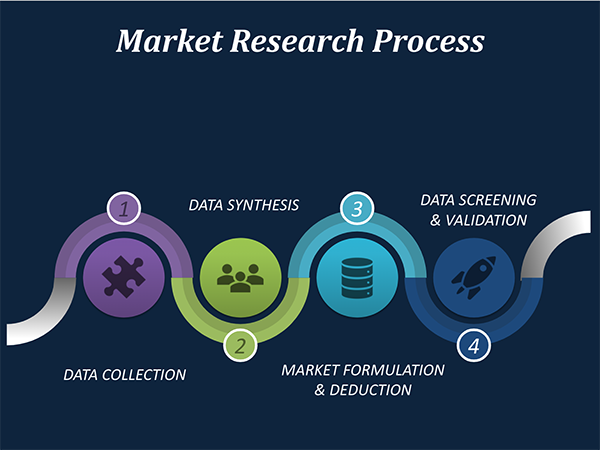
Data Collection: This stage of the market research process involves with the gathering and collecting of the market/industry related data from the sources. There are basically two types of research methods:
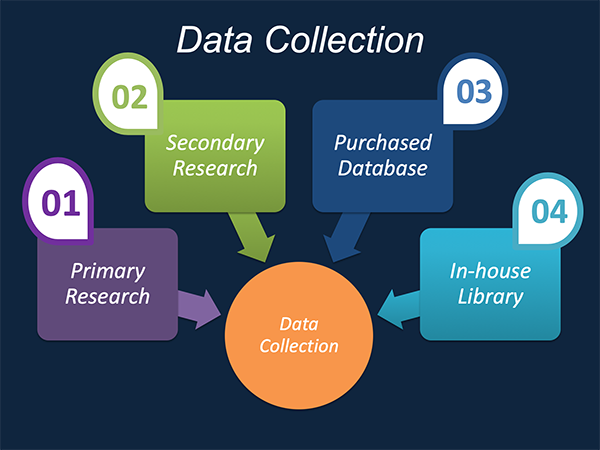
Data Synthesis: This stage includes the evaluation and assessment of all the data acquired from the primary and secondary research. It likewise includes in evaluating the information for any disparity watched while information gathering identified with the market. The data & information is gathered with consideration to the heterogeneity of sources. Scientific and statistical methods are implemented for synthesizing dissimilar information sets and provide the relevant data which is fundamental for formulating strategies. Our organization has broad involvement with information amalgamation where the information goes through different stages:
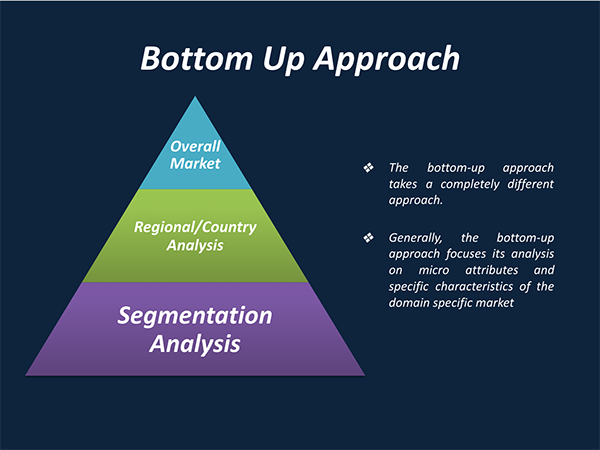
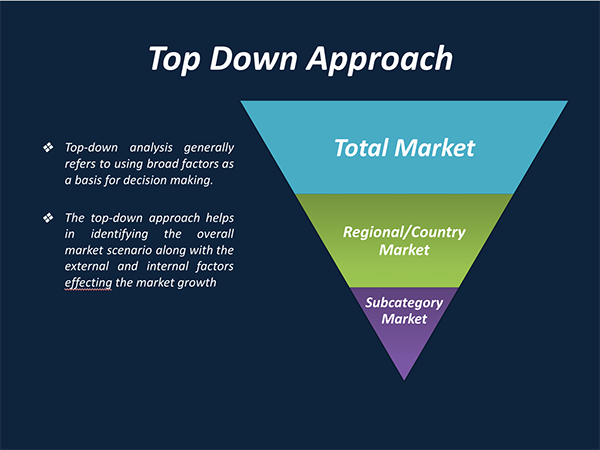
Market Formulation & Deduction: The last stage includes assigning the data & information in a suitable way in order to derive market size. Analyst reviews and domain based opinions based on holistic approach of market estimation combined with industry investigation additionally features a crucial role in this stage.
This stage includes with the finalization of the market size and numbers that we have gathered from primary and secondary research. With the data & information addition, we ensure that there is no gap in the market information. Market trend analysis is finished by our analysts by utilizing data extrapolation procedures, which give the most ideal figures to the market.
Data Validation: Validation is the most crucial step in the process. Validation & re-validation through scientifically designed technique and process that helps us finalize data-points to be used for final calculations. This stage also involves with the data triangulation process. Data triangulation generally implicates the cross validation and matching the data which has been collected from primary and secondary research methods.



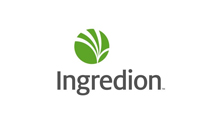



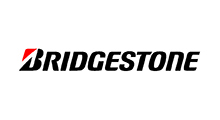
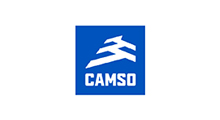
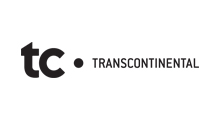

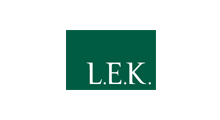


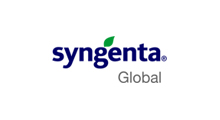







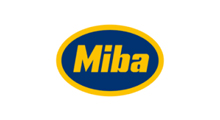









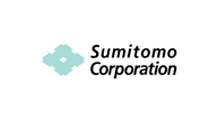


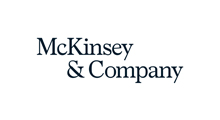









Free Customization
Countries can be added on demand
Free yearly update on purchase of Multi/Corporate User License
Companies served till date

We serve our customers 24x7 for 365 days through calls, emails and live chat options.

Huge database of exceptional market reports bringing market intelligence to your fingertips.

SSL enabled, we offer you various secured payment options for risk free purchase.